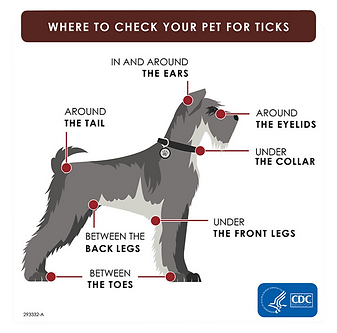Our Veterinarians
Our Veterinarians

Parasites can pop up unexpectedly and more commonly than you might think. Parasites can be either internal (i.e., heartworms, hookworms, tapeworms, and etc.) or external (i.e., fleas, ticks, mites, and etc.). Most parasites can be prevented through the use of broad spectrum, year-round products such as ProHeart, Heargard Plus, NexGard, and etc.
Note: Please visit this page to learn about Heartworm disease.
External Parasites (i.e. creepy crawlies)
External parasites such as fleas & ticks can attach themselves to your pets & then bring them home. Pets can also become infected through ingestion of contaminated feces or penetration through the skin. Once home, it can be difficult and expensive to kill parasites and treat the home to prevent re-infection. In addition to being an itchy and painful nuisance, fleas and ticks can also carry many disease, some of which can be deadly. Not only can they infect your pet(s), but they can also infect you and your family.
Examples of external parasites include:
-
Ear mites (for more information on ear mites)
-
Ticks (for more information on ticks)
-
Fleas (for more information on fleas)
-
Mange (demodectic and sarcopic) (more information on mange)
Preventing flea and tick infestations is achieved through consistent use of veterinary prescribed products such as Nexgard and Revolution. Over-the-counter options include Seresto collar and K9 Advantix II. Pet owners should only administer a product that is labeled for the correct species, age, and weight. If you find a flea or tick on your pet, please call us for a medical exam. We will treat your pet and possibly test your pet for infectious diseases transmitted by fleas and ticks.
Internal Parasites (i.e. intestinal worms)
Internal parasites can infect dogs and cats in a number of ways. Most commonly young puppies and kittens are infected with intestinal parasites such as hookworms and roundworms.
Some of the commonly diagnosed internal parasites include:
-
Giardia (more information on giardia)
-
Roundworms (more information on roundworms)
-
Coccidia (more information on coccidia)
-
Tapeworms (more information on tapeworms)
Signs of internal parasites may include:
-
Diarrhea
-
Weight loss or failure to gain weight
-
Pot belly appearance
-
Anemia
-
Lethargy
-
Visible parasite worms or eggs in feces
Treating for hookworms and roundworms normally begins as soon as 2 weeks of age and repeated every 2 weeks until the pet is on an approved monthly parasite preventative.
Fecal examination for parasites is useful to monitor product efficacy and screen for infection. Puppies and kittens should receive fecal examinations at least twice or until there are no parasites detected. We recommend fecal examinations for adult cats and dogs on every annual exam.
Parasites Infect People, Too!
Parasites not only infect our four-legged pets, but can also infect the two-legged family members, too. An illness that is transmitted from animal to human is called a zoonotic disease. Many of the parasites listed above can be transmitted from pets to people. These diseases can cause serious illness to people, especially children, pregnant mothers, and immunocompromised individuals. We recommend you speak with your physician if you are concerned about possible parasite exposure. Preventing parasite infection for the entire family can be achieved through consistent use of preventive products with our pets.
Prevention is the Best Cure
Making sure your pet is on a preventative can help reduce the chances of a parasite infection. There are a variety of choices, including a topical or oral preventative. Please call Oasis Animal Hospital for a parasite prevention recommendation. You may also visit our online pharmacy to view and purchase products.
For More Information
A very good resource for information and recommendations for the prevention of parasites is the Companion Animal Parasite Council.





